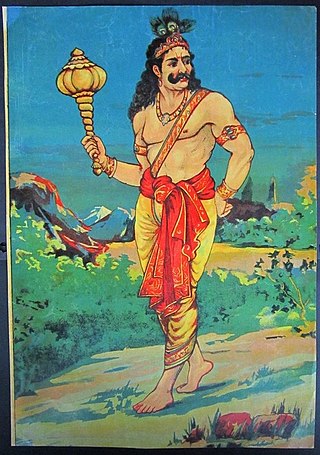
Bhima, also known as Bhimasena, is a divine hero and one of the most prominent figures in the Hindu epic Mahabharata, renowned for his incredible strength, fierce loyalty, and key role in the epic’s narrative. As the second of the five Pandava brothers, Bhima was born to Kunti—the wife of King Pandu—through the blessings of Vayu, the wind god, which bestowed upon him superhuman strength from birth. His rivalry with the Kauravas, especially Duryodhana, defined much of his life, with this tension ultimately erupting in the Kurukshetra War, where Bhima killed all hundred Kaurava brothers.
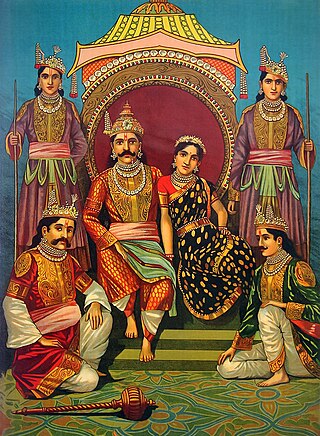
The Pandavas is a group name referring to the five legendary brothers, Yudhishtira, Bhima, Arjuna, Nakula and Sahadeva, who are central figures of the Hindu epic Mahabharata. They are acknowledged as the sons of Pandu, the King of Kuru, but were fathered by different Devas (gods) due to Pandu's cursed inability to naturally conceive children. In the epic, the Pandavas married Draupadi, the princess of Panchala, and founded the city of Indraprastha after the Kuru Kingdom was split to avoid succession disputes. After the split, the other part of the kingdom was ruled by their cousins, the Kauravas. However, the Pandavas lost their kingdom to Duryodhana when Yudhishtira gambled it away during a game of dice. The bet Yudhishtira agreed to was that the Pandavas would hand the kingdom to the Kauravas and go into exile for 13 years. After this time the Kauravas refused to return the kingdom. As a result, the Pandavas waged a civil war against their extended family, and this conflict was known as the Kurukshetra War. With the help of the god Krishna, the Pandavas eventually won the war with the death of the Kauravas, albeit at great cost.
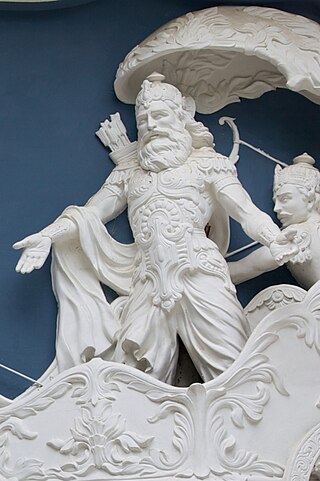
Bhishma, also known as Pitamaha, Gangaputra, and Devavrata, was a prince, statesman and commander of ancient Indian Kuru kingdom and is a major character of the epic Mahabharata and the protagonist of the Bhishma Parva episode. He was the supreme commander of the Kaurava forces during the Kurukshetra War. He was the only character who witnessed the entirety of the events of the Mahabharata, beginning from the reign of his father, King Shantanu of the Kuru kingdom. Bhishma was the stepbrother of Vyasa, the grandfather of both the Pandavas and the Kauravas. He was a prominent statesman of the Kuru Kingdom. He was born as the youngest son of King Shantanu and goddess Ganga.
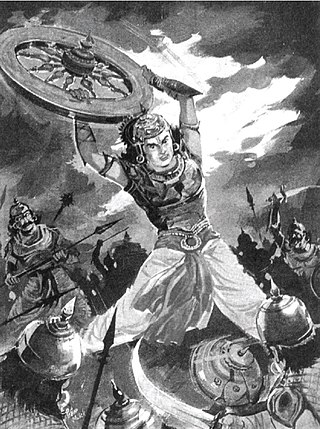
Abhimanyu is a warrior in the Hindu epic Mahābhārata. He was a young and valiant warrior of the Kuru lineage, born to Arjuna—the third Pandava brother—and Subhadra—the sister of the deities Krishna and Balarama. He was also one of the few individuals, along with his father, who knew the technique to enter the Chakravyuha, a powerful military formation. Abhimanyu was raised by his maternal family in Dvārakā because the Pandavas had been exiled for thirteen years by their cousins, the Kauravas. After his father's return, his marriage was arranged with Uttarā, the princess of the Matsya Kingdom.

Pandu was the king of Kuru kingdom, with capital at Hastinapur in the epic Mahabharata. He was the foster-father of the five Pandavas, who are the central characters of the epic.
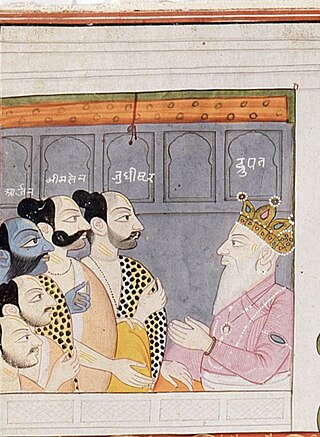
Drupada, also known as Yajnasena, is the king of the southern part of Panchala Kingdom, in the Hindu epic Mahabharata. He is the father of Draupadi, the epic's lead female character. In the Kurukshetra War as the head of 1 akshauhini army, Drupada fought from the side of his sons-in-law, the Pandavas, and was killed by his childhood friend and rival, Drona.

Nakula was the fourth of the five Pandava brothers in the ancient Indian epic, the Mahabharata. He and his twin brother Sahadeva were the sons of Madri, one of the wives of the Pandava patriarch Pandu, and Ashvini Kumaras, the divine twin physicians of the gods, whom she invoked to beget her sons due to Pandu's inability to progenate. Nakula is described as the most handsome man of his lineage, and was renowned for his beauty, skill in swordsmanship and horse keeping.

Shikhandi is a character in the Hindu epic Mahabharata. Born as Shikhandini, daughter of Drupada, the King of Panchala, Shikhandi becomes male after agreeing to a sex exchange with a yaksha. He is the brother of Draupadi, the female protagonist of the epic, who is the common wife of the Pandavas.

Kripa, also known as Kripacharya, is a figure in Hindu mythology. According to the epic Mahabharata, he was a council member of Kuru Kingdom and a teacher of the Pandava and Kaurava princes.

The Kurukshetra War, also called the Mahabharata War, is a war described in the Hindu epic poem Mahabharata, arising from a dynastic struggle between two groups of cousins, the Kauravas and the Pandavas, for the throne of Hastinapura. The war is used as the context for the dialogues of the Bhagavad Gita.
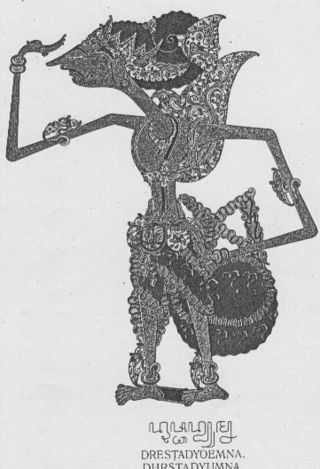
Dhrishtadyumna is the son of Drupada—the king of the Panchala kingdom—and the twin brother of Draupadi in the Hindu epic Mahabharata.

Jayadratha is the king of the Sindhu kingdom featured in the Mahabharata. He was married to Dushala, the only sister of the hundred Kaurava brothers. The son of the king Vriddhakshatra, he is killed by Arjuna. He has a son named Suratha.
Kritavarma is a Vrishni Yadava warrior in Hinduism. He appears as a minor character in the Mahabharata, fighting in the Kurukshetra war for the Kauravas. Kritvarma was the commander of the Narayani sena consisting of gopas.

Ulupi, also known as Uluchi and Ulupika, is a Naga princess mentioned in the Hindu epic Mahabharata. Ulupi is the daughter of the king Kauravya, and is the second wife of Arjuna. She also finds a mention in the Vishnu Purana and the Bhagavata Purana.

Uttarā was the princess of Matsya, as described in the Hindu epic Mahabharata. She was the daughter of King Virata and Queen Sudeshna, at whose court the Pandavas spent a year in concealment during their exile. During this period, she learned music and dance from Arjuna, the third Pandava, and later married his son, Abhimanyu. Uttarā was widowed at a young age during the Kurukshetra War. Following the Pandavas' victory in the war, she and her unborn son were attacked by Ashwatthama, and were saved by the divine intervention of Krishna. Her son Parikshit saved the Kuru lineage from extinction, and became a well-known monarch celebrated in both the Mahabharata and the Bhagavata Purana.
Kamyakavana, also referred to as the Kamyaka forest, is a legendary forest featured in the Hindu epic Mahabharata. It is described to be located on the banks of the river Sarasvati. The Pandavas are described to have spent a period of their exile in this forest.

The Panchakanya is a group of five iconic women of the Hindu epics, extolled in a hymn and whose names are believed to dispel sin when recited. They are Ahalya, Draupadi, Kunti, Tara, and Mandodari. While Draupadi and Kunti are from the Mahabharata, Ahalya, Tara, and Mandodari are from the Ramayana. The Panchakanya are regarded to be ideal women who exemplify perfect wives in Hinduism.
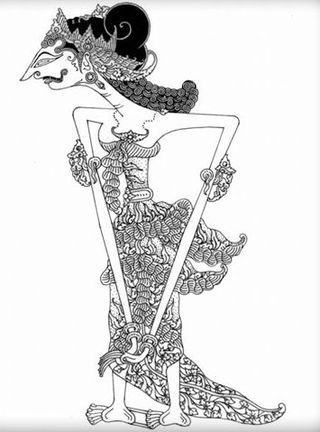
Amba is a character in the Hindu epic Mahabharata. She is the eldest and most beautiful daughter of Kashya, the King of Kashi, and the sister of Ambika and Ambalika.
Uttamaujs and Yudhamanyu are two brothers from the Panchala kingdom featured in the Hindu epic Mahabharata. In some versions of the epic, they were the sons of Panchala king Drupada and thus the brothers of Draupadi. During the Kurukshetra War, they became the bodyguards of Arjuna and fought a battle against Duryodhana.

















